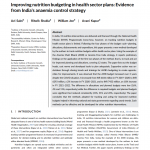
Financial Inclusion: Please Do Not Forget Our Urban Poor!
25 February 2010
Premila Nazareth Satyanand
Respected Pranab da,
While the nation lauds the Government’s single-minded drive to take banking to rural doorsteps, the Finance Ministry and the RBI are sadly neglecting a key constituency: the impoverished millions on the doorsteps of urban banks, denied access for lack of ‘papers’. Despite the Government’s clarion call to financial inclusion, my friends and I continue to find it difficult – if not impossible – to open accounts for our cooks, maids, drivers and gardeners.
Breaking the Gordian knot of identity and address documents
Partly responsible are the Reserve Bank of India’s 2002 ‘Know Your Customer’ rules which require banks to check the background of prospective applicants to guard against money laundering and terrorism financing. Applicants must prove both identity and residence through one of six documents. Passport, PAN card, voter’s card, driving license, identity card, or letter from a recognised public authority/ public servant in the first case; and telephone or electricity bill, ration card, bank account statement, or letter from employer/recognised public authority in the second.
Predominantly rural migrants, most of our urban poor do not have the correct combination of identity and address documents necessary to open accounts. The key sticking point is ‘local address’. This I learnt when I tried to open an account for Mahesh, the young Uttaranchali who lives and works in my house. He has a high-school I.D., a ration card, and a voter’s card (three KYC- approved identity documents), but these were insufficient to prove his bona fide. For, they display an Uttaranchal, not a Delhi address. Sona, our Maharashtrian ayah has no documentation at all, so hers was a ‘shut-before-opening’ case.
Recognising this Gordian knot, the RBI relaxed the documentary requirements for small deposit (or ‘no frills’) accounts with a total balance of Rs 50,000. In its Master ‘Know Your Customer’ Circular of July 2009, it ruled that a written introduction/certification from an account holder was sufficient to open such accounts, provided the account was “over six months old and showed satisfactory transactions.”
Continuing violations by urban banks
Yet, eight months later, in direct contravention of this ruling, banks across the country continue to refuse to honour letters of introduction from account-holders/employers as sufficient evidence of identity and address. Bank branches have either not been properly briefed about the July 2009 relaxations, or they are using the 2002 KYC obligations as a convenient smoke-screen to duck opening un-remunerative accounts for the poor. No surprise then that just 2% of our over 33 million ‘no frills’ accounts are urban, as the Skoch Institute estimates. In real terms, this is just 66,000 accounts. Minuscule in the context of India’s urban poor population of between 80 million to 190 million. We could immediately bring much of this population into the formal banking system, merely by pressuring the banks to adhere to the RBI’s July 2009 relaxations. The national drive to financially empower the poor must thus strategically invest in tracking and pushing inclusion in urban areas.
It is essential we start immediately. UNDP’s ‘Indian Urban Poverty Report 2009’ shows India’s urban population doubling from 286 million to 575 million by 2030. More worryingly, it projects continued growth in our urban poor population, due to expanding rural in-migration and lack of public services. Continuing exclusion from formal banking services will only aggravate this unfortunate trend. Bringing the poor into the banks is also essential to establishing their identity within other formal skills and livelihood systems.
The banks’ need for caution is understandable. But our system’s dogged insistence on ‘local address’ is misplaced, given an expanding ATM network and growing geographic mobility. In any case, most small depositors use their accounts primarily to store and save money. Thus, should they vanish with all their money, it is theirs and nobody else’s. Moreover, small deposits do not easily lend themselves to the kinds of scam seen on stock markets.
Domestic workers: the low-hanging fruit
India’s 95-100 million domestic workers present the lowest-hanging fruit in the urban financial inclusion campaign. For, they all have close, organic links to households already within the banking system, significantly reducing the risk for banks. Since 90% of these workers are women, the implications for social empowerment are significant.
This category of worker is also likely to make larger and more regular deposits than most urban and rural poor counterparts. In bigger cities, average domestic worker salaries range from 3,500 to Rs 5,000 and average monthly savings from Rs 500-Rs 1,000. Employers would be happy to pay salaries via recurring monthly deposits. Account holders are likely to make one or two withdrawals a month. Urban ‘no frills’ accounts are thus likely to be continually active, cutting to the heart of the banks’ complaint that only 11% of the nearly 33 million rural accounts are.
The Government must thus do some quick and clever thinking on how to incentivise our banks to, first, admit and, then, effectively serve our urban poor. To quote S.S.Tarapore, “No individual should be denied the right to open an account.” Some ‘carrot’ and some ‘stick’ might be required. But, judging from India’s telecom experience, energetic attention to enforcing banks’ urban ‘universal service obligation’ is more likely to trigger a low-cost system of ‘mass banking’, than crores of Budget spending on technology platforms and rural banking infrastructure.
Premila Nazareth Satyanand is an independent policy analyst.





